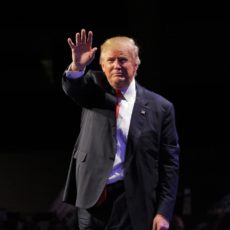What Trump Can Learn from the Treaty that Created America
 In January, the winds of political change often blow with ferocity. The District of Columbia is now bracing itself for a gale-force disruption as Donald Trump prepares to become the 45th President of the United States. An upheaval in foreign affairs, trade, and immigration policy is in the offing.
In January, the winds of political change often blow with ferocity. The District of Columbia is now bracing itself for a gale-force disruption as Donald Trump prepares to become the 45th President of the United States. An upheaval in foreign affairs, trade, and immigration policy is in the offing.
It’s tempting to focus solely on the changes Mr. Trump has promised, but the public and the incoming administration should reserve some time to remember their history—and learn from it. January 14 marked the 233rd anniversary of the Confederation Congress’s ratification of the Treaty of Paris, the agreement that formally ended the Revolutionary War between Great Britain and the United States.
Not long after British General Charles Cornwallis surrendered at Yorktown to General Washington, peace talks began in the French capital. Great Britain was represented by Richard Oswald, and the United States by Benjamin Franklin, John Jay, and John Adams.
The Americans shrewdly negotiated a resolution without deferring to, or seeking input from, their French and Spanish allies. While the French, and to a lesser extent the Spaniards, had been instrumental in the fight for independence, Franklin, Jay, and Adams realized that their allies’ post-war agenda was not congruent with American interests—especially regarding westward expansion.
The Americans negotiated a very favorable treaty that secured recognition of independence, the withdrawal of British forces “with all convenient speed,” a generous swath of western territory, fishing rights off Newfoundland and Nova Scotia, and navigation of the Mississippi. They also promised the British that loyalist property would no longer be confiscated and that Congress would recommend to the states that they make restitution for all previous confiscations.
The Treaty of Paris was the defining achievement of the United States under the Articles of Confederation.
So what can Mr. Trump and the American people learn from it? Many things.
The first lesson should be the rightful place of the states in our federal government. Article One of the Treaty poignantly accepted their individual sovereignty:
“His Brittanic Majesty acknowledges the said United States, viz., New Hampshire, Massachusetts Bay, Rhode Island and Providence Plantations, Connecticut, New York, New Jersey, Pennsylvania, Delaware, Maryland, Virginia, North Carolina, South Carolina and Georgia, to be free sovereign and independent states, that he treats with them as such, and for himself, his heirs, and successors, relinquishes all claims to the government, propriety, and territorial rights of the same and every part thereof.”
Many nationalists have argued that the American nation preceded the states, but the Treaty of Paris throws cold water on this contention. George III acknowledged that his thirteen former colonies were “free sovereign and independent states.” Even tiny Delaware was recognized as taking a place on the world map as a sovereign state, with equal dignity to the great powers such as France, Spain, and Great Britain.
It is true that under the Constitution of 1787 many powers that the states enjoyed in 1784 were delegated to the federal government. However, as James Madison observed in Federalist No. 46, “the federal and state governments are in fact but different agents and trustees of the people, instituted with different powers, and designated for different purposes.” Inasmuch as the people of the several states are sovereign and thus the fount of all power, the states remain fully sovereign over all affairs not specifically delegated to the federal government.
Over the years, the states have come to be seen as mere administrative subdivisions of the national government. This is a great falsehood. The Trump administration should treat the states with the dignity to which they are entitled as enshrined in the Treaty of Paris and in our Constitution.
The states can and should serve as laboratories of democracy, whenever policy experimentation is possible. If the Trump administration eschews one-size-fits-all national remedies and allows the states to develop their own answers, then he can truly claim to be part of an American revolution.
A second lesson can be garnered from the steadfast negotiations of Franklin, Jay, and Adams. These patriots secured peace with Great Britain by employing a distinctly America First strategy. They were well aware of the contributions France and Spain made to the cause of independence, but they refused to put the interests of these foreign powers ahead of the United States.
Mr. Trump has been outspoken in condemning the foreign wars, overseas meddling, and nation-building of previous administrations. We can only hope that he adheres to a non-interventionist foreign policy once he takes the reins of government. In dealings with other nations, American interests in peace and domestic prosperity should prevail over the shrieks of the war hawks.
On January 14, 1784, Congress ratified the Treaty of Paris and showed the world that a confederated government could defeat an imperial superpower. Let’s take time out to remember this achievement and contemplate its lessons for today.
* * *
William J. Watkins, Jr. is a research fellow at the Independent Institute and the author of Crossroads for Liberty: Recovering the Anti-Federalist Values of America’s First Constitution.





